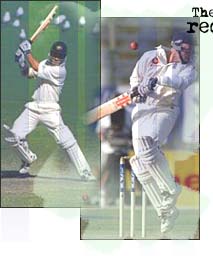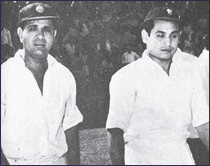
 February 5, 2001
February 5, 2001(Last) Words to Treasure
Roshan Paul
"Even the best batsmen today have faulty technique - they do
not get behind the line of the ball and that is why they get
out caught behind or in the slips so many times."
I was hit by an eerie sense of disbelief when I picked up the newspaper this morning to read that Pankaj Roy, India's best opening batsman before Sunil Gavaskar came along, had passed away. For, just three days ago, I had had a fascinating and extremely pleasant conversation with him.
I called Roy to get him to talk about the Australian team's visit to India in 1956 and 1959, as part of Rediff.com's special on the upcoming tour. Roy was happy to talk to me and graciously spent a few minutes reminiscing about Indian cricket in the 1950s.
He confessed his nervousness and that of the whole team just before that series in 1956. The Australian team in those days was easily the best in the world, he said. And the Indians didn't have the players to match their calibre. They had never faced bowling as fast and accurate as that of the likes of Ray Lindwall and Keith Miller. As for him, as the team's one settled opening batsman, the responsibility was especially greater.
 One disappointment he did talk about was that he was passed over the captaincy in the 1959-60 tour against the visiting Australians. The competition was between him and Polly Umrigar but the selectors eventually chose G. S. Ramchand, someone Roy felt "was not worth his place in the side as a cricketer".
One disappointment he did talk about was that he was passed over the captaincy in the 1959-60 tour against the visiting Australians. The competition was between him and Polly Umrigar but the selectors eventually chose G. S. Ramchand, someone Roy felt "was not worth his place in the side as a cricketer".
It was evident that even today, more than 40 years later, the slight to his pride still rankled.
After taking a few jibes at the selectors and their general ineptitude, Roy then diverged from the topic a little to launch into a discourse about batting today, and how much easier it is with covered pitches, tons of protective gear and restrictions on bouncers and beamers. (He mentioned a couple of deadly accurate beamers that Lindwall, in particular, bowled to him.) But besides all that, he said that batsmen in those days were better equipped technically - as they had to be - to deal with the bowlers of those days.
"Today's batsmen play too much away from their body... they don't get behind the line of the ball," Roy pointed out. He also scoffed at the criteria for measuring a fast bowler these days. Only Brett Lee, among today's bowlers, would have been a fast bowler in the 1950s and 1960s, according to Roy. Bowlers then easily touched 95mph and did it quite regularly.
Talking to the man, I was filled with a sense of awe about what cricket would have been like in days of yore. I began to understand why old-timers repeatedly dismiss one-day cricket, with its frills and restrictions on bowlers, as not being a pure enough version of the game.
Having such a clear memory of things that happened over four decades ago is quite phenomenal. If the telephone wire (and thousands of kilometres) didn't separate us, I'm sure I would have seen the stars in his eyes as he relived the days when he represented his country on the cricket field. Although he did show signs of a memory that wasn't a hundred per cent accurate, he made me wish that I possess as clear a picture of my youth when I am 73 years old.
I hung up more than a little awed at having had a conversation with one of India's greatest former cricketers. He sounded hale and fit and cheerful over the phone and I'd never have guessed that he would pass away in a couple of days.
I have been fortunate enough to see and experience a lot of the world before my 21st birthday, and reading the sad news of Pankaj Roy's demise just days after I had chatted with him sharply reminded me of man's mortality. It's a sobering thought.
Design: Devyani Chandwarkar
Illustration: Dominic Xavier
©1996 to 2001 rediff.com India Limited. All Rights Reserved.